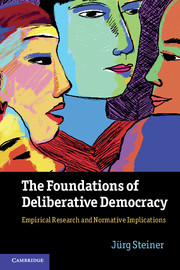Book contents
- Frontmatter
- Contents
- Figures
- Acknowledgments
- Introduction
- 1 Citizen participation in deliberation
- 2 Rationality and stories in deliberative justification
- 3 Common good and self-interest in deliberative justification
- 4 Respect in deliberation
- 5 Public openness of deliberation
- 6 Force of better argument in deliberation
- 7 Truthfulness in deliberation
- 8 Deliberation in the media and the Internet
- 9 Favorable conditions for deliberation
- 10 Favorable consequences of deliberation
- 11 The praxis of deliberation
- Appendix Newest version of Discourse Quality Index (DQI)
- Index
- References
9 - Favorable conditions for deliberation
Published online by Cambridge University Press: 05 August 2012
- Frontmatter
- Contents
- Figures
- Acknowledgments
- Introduction
- 1 Citizen participation in deliberation
- 2 Rationality and stories in deliberative justification
- 3 Common good and self-interest in deliberative justification
- 4 Respect in deliberation
- 5 Public openness of deliberation
- 6 Force of better argument in deliberation
- 7 Truthfulness in deliberation
- 8 Deliberation in the media and the Internet
- 9 Favorable conditions for deliberation
- 10 Favorable consequences of deliberation
- 11 The praxis of deliberation
- Appendix Newest version of Discourse Quality Index (DQI)
- Index
- References
Summary
Normative controversies in the literature
Establishing favorable conditions for deliberation is not a straightforward taskbecause, empirically, deliberation is a multidimensional phenomenon. This wasnot fully recognized for a long time in the philosophical literature. In theHabermasian ideal speech situation, all deliberative elements have high values.Habermas acknowledges that this ideal speech situation hardly ever occurs and isas rare as “islands in the ocean in everyday praxis.” Therefore,particular speech acts in the real world are always more or less distant fromthe ideal speech situation. Most theorists do not pay sufficient attention tothe possibility that for a particular speech act some deliberative elements maybe closer to the ideal speech situation than others. The prevailing assumptionis that for a given speech act all deliberative elements have more or less thesame distance to the ideal speech situation. If, for example, actors justifytheir claims in a rational way, they also show respect toward the claims ofothers. If, on the other hand, the level of justification is low, the level ofrespect is also low. In this way, deliberation is seen as a one-dimensionalphenomenon. All elements cluster together in a single dimension, and if oneelement goes up or down, all other elements do the same. Also, not enoughattention is paid by many theorists to the possibility that during a decisionprocess the level of deliberation may fluctuate over time.
Robert E. Goodin was the first theorist to systematically investigate themultidimensional and sequential aspects of deliberation. We have alreadyencountered part of his argument in Chapter 5. There, we have seen that forGoodin it is not necessary that all phases of a decision process are open to thepublic. His larger point is that deliberation has to be seen in sequences of adecision process and that not all deliberative elements need to be present inall sequences. What counts for Goodin is “having all of the deliberativevirtues on display at some point or another in the decisionprocess.” He emphasizes the multidimensional and sequential character ofdeliberation when he postulates “deliberative virtues coming in the rightcombination and the right order,” and he acknowledges that there may be“interactions between different deliberative virtues.”
Information
- Type
- Chapter
- Information
- The Foundations of Deliberative DemocracyEmpirical Research and Normative Implications, pp. 183 - 218Publisher: Cambridge University PressPrint publication year: 2012
